The US Air Force Academy on Friday called Taiwan a foreign nation when introducing Taiwanese cadets at its graduation ceremony, which was attended by US President Donald Trump.
“We are pleased to have in the class graduates from 10 foreign nations,” a US Air Force officer presiding over the ceremony said, before naming Taiwan, Kazakhstan, South Korea, Romania, Rwanda, Sri Lanka, Thailand, the Philippines, Singapore and Tunisia.
As each nation was called, a cadet from that nation stood and displayed their flag, which the audience acknowledged with cheers.

Photo: Reuters
A video released by the academy showed a Taiwanese graduate standing and waving the Republic of China (ROC) flag.
The ROC Air Force could not be reached to clarify the number of Taiwanese cadets in the academy’s graduating class of 989 people.
The Taiwanese military is known to send personnel to train at US military academies each year.

Photo: AFP
The ROC flag also appears in a photograph in which Trump poses with graduates during the commencement ceremony.
The photograph was shared on the White House’s Instagram account.
The academy’s gesture is one of the many signs Taiwan-US relations are normalizing, Institute for National Defense and Security Research senior analyst Su Tzu-yun (蘇紫雲) said.
The US Air Force Academy gave the ROC flag more prominence by placing it near Trump, he added.
In February, ROC Air Force Lieutenant Colonel Liu Chih-tung (劉志堂) and another officer attended a series of training exercises at the US’ Anderson Air Force Base in Guam, and wore their field uniforms and full rank markings, not the customary plainclothes, Su said.
The Trump administration has changed Washington’s perception of Taiwan and the difference in approach would become more evident as the US promulgates and implements the Taiwan Assurance, Taiwan Travel and Asia Reassurance Initiative acts, he said.
Additional reporting by Huang Hsin-po

CHAOS: Iranians took to the streets playing celebratory music after reports of Khamenei’s death on Saturday, while mourners also gathered in Tehran yesterday Iranian Supreme Leader Ayatollah Ali Khamenei was killed in a major attack on Iran launched by Israel and the US, throwing the future of the Islamic republic into doubt and raising the risk of regional instability. Iranian state television and the state-run IRNA news agency announced the 86-year-old’s death early yesterday. US President Donald Trump said it gave Iranians their “greatest chance” to “take back” their country. The announcements came after a joint US and Israeli aerial bombardment that targeted Iranian military and governmental sites. Trump said the “heavy and pinpoint bombing” would continue through the week or as long

TRUST: The KMT said it respected the US’ timing and considerations, and hoped it would continue to honor its commitments to helping Taiwan bolster its defenses and deterrence US President Donald Trump is delaying a multibillion-dollar arms sale to Taiwan to ensure his visit to Beijing is successful, a New York Times report said. The weapons sales package has stalled in the US Department of State, the report said, citing US officials it did not identify. The White House has told agencies not to push forward ahead of Trump’s meeting with Chinese President Xi Jinping (習近平), it said. The two last month held a phone call to discuss trade and geopolitical flashpoints ahead of the summit. Xi raised the Taiwan issue and urged the US to handle arms sales to

BIG SPENDERS: Foreign investors bought the most Taiwan equities since 2005, signaling confidence that an AI boom would continue to benefit chipmakers Taiwan Semiconductor Manufacturing Co’s (TSMC, 台積電) market capitalization swelled to US$2 trillion for the first time following a 4.25 percent rally in its American depositary receipts (ADR) overnight, putting the world’s biggest contract chipmaker sixth on the list of the world’s biggest companies by market capitalization, just behind Amazon.com Inc. The site CompaniesMarketcap.com ranked TSMC ahead of Saudi Aramco and Meta Platforms Inc. The Taiwanese company’s ADRs on Tuesday surged to US$385.75 on the New York Stock Exchange, as strong demand for artificial intelligence (AI) applications led to chip supply constraints and boost revenue growth to record-breaking levels. Each TSMC ADR represents

State-run CPC Corp, Taiwan (CPC, 台灣中油) yesterday said that it had confirmed on Saturday night with its liquefied natural gas (LNG) and crude oil suppliers that shipments are proceeding as scheduled and that domestic supplies remain unaffected. The CPC yesterday announced the gasoline and diesel prices will rise by NT$0.2 and NT$0.4 per liter, respectively, starting Monday, citing Middle East tensions and blizzards in the eastern United States. CPC also iterated it has been reducing the proportion of crude oil imports from the Middle East and diversifying its supply sources in the past few years in response to geopolitical risks, expanding